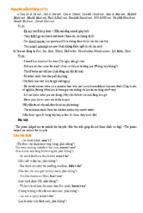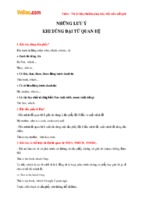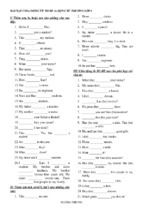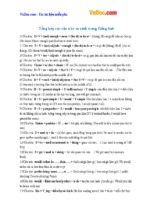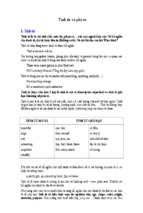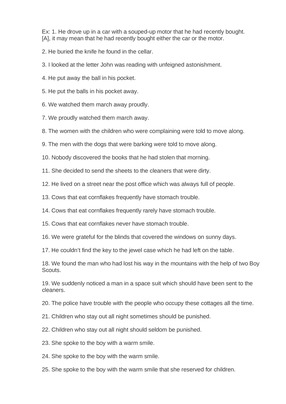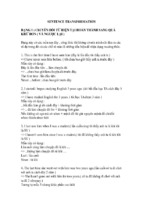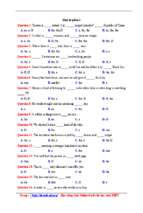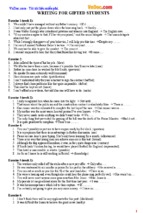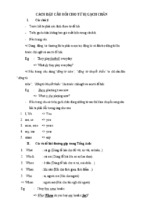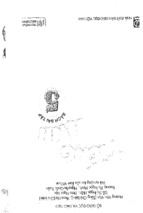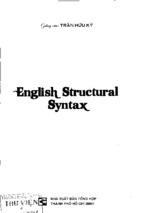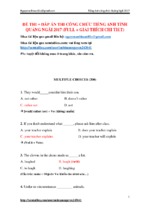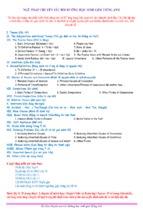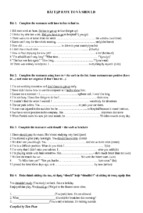Mô tả:
Phân biệt thì tương lai đơn và tương lai gần
PHÂN BIỆT THÌ TƯƠNG LAI ĐƠN VÀ TƯƠNG LAI GẦN
Thì tương lai đơn
Cấu trúc (+) S + will + V(nguyên thể)
Thì tương lai gần
(+) S + is/am/ are + going to + V(nguyên thể)
- She will buy a new mobile phone.
(Cô ấy sẽ mua một chiếc điện thoại
mới.)
- They are going to build a new house this year.
(-) S + will + not+ V(nguyên thể)
(-) S + is/am/are + not + going to + V (nguyên thể)
- He won’t come back tomorrow.
- She isn't going to meet her friend’s parents tomorrow.
(Anh ấy sẽ không quay trở lại vào
ngày mai.)
(Cô ấy sẽ không gặp bố mẹ của bạn cô ấy vào ngày mai.)
(?) Will + S + V(nguyên thể)?
(?) Is/Am/ Are + S + going to + V(nguyên thể)?
Trả lời:
Trả lời:
(Họ sẽ xây một ngôi nhà mới trong năm nay.)
Yes, S + will.
Yes, S + is/ am/ are.
No, S + won't.
No, S + isn't/ am not/ aren't.
- Will you bring me something to
drink? (Bạn sẽ mang cho tớ cái gì đó
để uống chứ?)
- Are you going to sell your apartment? (Bạn sắp bán căn
hộ của bạn à?)
Yes, I am./ No, I'm not
Yes, I will/ No, I won't
Cách sử
dụng
1. Dùng để diễn tả một quyết định,
ý định nảy ra tức thời ngay tại thời
điểm nói
1. Dùng để diễn tả một dự định đã có kế hoạch từ
trước.
- Ok. I will go with you tomorrow.
- I have bought my ticket because I am going to travel in
HCM this weekend.
(Được rồi. Ngày mai tôi sẽ đi với
bạn.)
(Tôi vừa mới mua vé bởi vì tôi sẽ du lịch ở thành phố Hồ
Chí Minh vào cuối tuần này.)
2. Diễn tả một dự đoán mang tính
chủ quan không có căn cứ
2. Diễn tả một dự đoán có căn cứ xác định, có dẫn
chứng cụ thể
- I think it will rain soon. (Tôi nghĩ
rằng trời sẽ mưa sớm thôi.)
Dấu hiệu - think, believe, suppose,…
nhận biết
- perhaps, probably,
- Look at the dark cloud! It is going to rain. (Hãy nhìn
những đám mây đen kia kìa! Trời sắp mưa rồi.)
- Dẫn chứng cụ thể
Ví dụ:
- promise
- Look at the black cloud on the sky! It is going to rain.
- If (trong câu điều kiện loại I-giả
định một điều có thể xảy ra ở hiện tại
hoặc tương lai)
(Hãy nhìn những đám mây đen trên bầu trời kìa! Trời sắp
mưa rồi.)
Ví dụ:
- I believe she will be successful one
day. (Tôi tin rằng một ngày nào đó cô
ấy sẽ thành công.)
Bài tập:
Bài 1: Cho dạng đúng của động từ trong ngoặc:
1. I love London. I (probably / go) there next year.
2. What (wear / you) at the party tonight?
3. I haven't made up my mind yet. But I think I (find) something nice in my mum's wardrobe.
4. I completely forget about this. Give me a moment, I (do) it now.
5. Tonight, I (stay) home. I've rented a video.
6. I feel dreadful. I (be) sick.
7. If you have any problem, I (help) you.
8. The weatherforcast says it (not/ rain) tomorrrow
9. I promise that I (not/ come) late.
10. Look at those clouds. It (rain) now.
Bài 2: Hoàn thành các câu sau sử dụng dạng đúng của động từ trong ngoặc.
1. I have bought two tickets. My wife and I ________________________ (see) a movie tonight.
2. Mary thinks Peter ________________________ (get) the job.
3. A: “I _________________________(move) from my house tomorrow. I have packed
everything”
B: “I _________________________ (come) and help you.”
4. If I have enough money, I _________________________ (buy) a new car.
5. I _________________________ (be) there at four o'clock, I promise.
6. The meeting _________________________ (take) place at 4 p.m.
7. If you eat all of that cake, you _________________________ (feel) sick.
8. They _________________________ (be) at home at 10 o'clock because their son is staying
alone at home.
9. Perhaps she _________________________ (not / be) able to come tomorrow.
10. Because of the train delay, the meeting _____________(not / take) place at 10 o'clock.
11. If it rains, they _________________________ (not / go) to the seaside.
12. In my opinion, she _________________________ (fail) the exam.
13. He _________________________ ( sell) the car if he doesn’t have enough money to build a
new house.
14. She is very tired, she _________________________ (take) a rest.
15. According to the weather forecast, it ____________________ (not / rain) this weekend.
16. If you lose your job, what ____________________ (you / do)?
17. In your opinion, ____________________ (she / be) a good teacher?
18. What time ____________________ (the sun / set) today?
19. Do you think she ____________________ ( get) the money from her boss?
20. ____________________(you/ take) the children to the cinema this weekend? I have seen
some tickets on the table.
Bài 3: Chia động từ trong ngoặc:
1. Mr. Pike ___________________ (teach) English at our school for 20 years before he retired
last year.
2. Henry __________________ (live) in New York for ten years before he _______________
(move) to Chicago last month.
3. It was at the airport when he realised that he _________________(leave) his passport at home.
4. Who _________________ (lead) the conference tomorrow?
5. I can’t get used _____________________ (get) up so early. I’m tired all the time.
* Listen and fill in the blanks:
When I am down and, oh my soul, so weary;
When(1) …………. come and my heart burdened be;
Then, I am still and wait here in the (2)……………..,
Until you come and sit awhile with me.
You raise me up, so I can stand on (3)……………………;
You raise me up, to walk on stormy seas;
I am strong, when I am on your shoulders;
You raise me up... To more than I can be.
[Instrumental break]
You raise me up, so I can stand on mountains;
You raise me up, to walk on stormy seas;
I am strong, when I am on your (4)…………………;
You raise me up... To more than I can be.
You raise me up, so I can stand on mountains;
You raise me up, to walk on stormy seas;
I am strong, when I am on your shoulders;
You raise me up... To more than I can be.
You raise me up, so I can stand on mountains;
You raise me up, to walk on stormy seas;
I am strong, when I am on your shoulders;
You raise me up... To more than I can be.
You raise me up... To more than I can be.
- Xem thêm -


